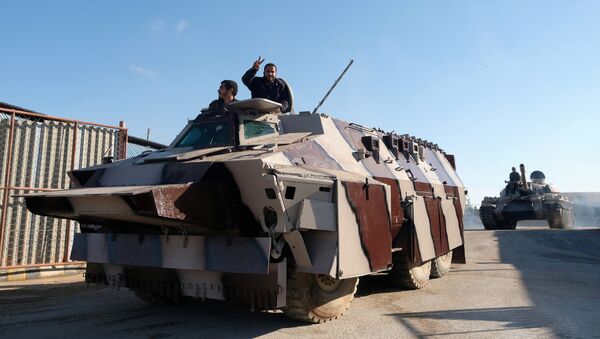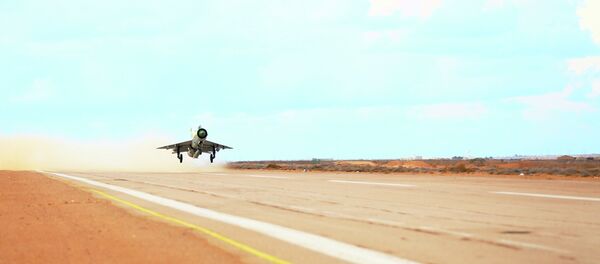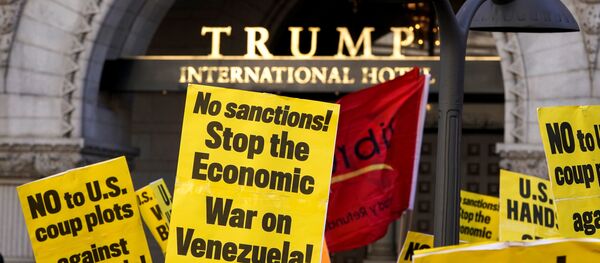According to the World Health Organisation, since the beginning of the operation by Haftar's forces to "liberate the capital", more than 450 people have been killed and 2,000 injured. While the situation at the front has stabilised and neither side has been able to achieve a decisive advantage, Prime Minister Sarraj travelled to several European capitals to secure support in the confrontation with Field Marshal Haftar. The head of the LNA, for his part, has twice visited Egypt, often considered his closest ally.
The Chairman of the House of Representatives of Libya (Libyan Parliament), Aguila Saleh Issa, who supports Haftar, has answered Sputnik's questions about the situation in Tripoli and the international aspect of the Libyan stand-off.
Sputnik: Does the operation to liberate Tripoli have domestic support? How do political movements and Libyan tribes perceive it?
Aguila Saleh: Of course, there is support from the side of the Libyan tribes regarding the liberation of the Libyan capital from various terrorist organisations that are controlled by persons subject to domestic and international arrest warrants. They control the so-called government of Fayez al-Sarraj and all state entities in the capital and loot public funds.
It is the army that ensures the safety of oil fields and oil exports. But the revenues from its sale go to the Central Bank of Libya in Tripoli, which is under the control of terrorist groups. The Libyan people have all the rights to these riches but in the end, they get nothing.
Therefore, when meeting on Saturday 27 April in the city of Al Qubbah, Libyan tribes supported the army's actions, including those of eastern Libya, as well as the South and West, such as Tarhona, Warfalla, and Sabratha.
READ MORE: Libya's UN-Backed Government Head Sarraj to Meet With Macron on Wednesday
Sputnik: How do you assess the stance of foreign states, including neighbours, as well as both regional and international forces? Is any military assistance being provided?
Aguila Saleh: None of the neighbouring states is playing an intelligible role, except Egypt, which openly supports the Libyan National Army in the fight against terrorism and its eradication. It not only wants to guarantee stability in Libya but also to protect Egyptian national security, to prevent the illegal flow of arms and halt the proliferation of militants.
Sputnik: The Prime Minister of the Government of National Accord of Libya Fayez al-Sarraj went on overseas trips around Europe, and held talks with the leadership of several key countries. Could this have an impact on the situation inside Libya?
Aguila Saleh: Sarraj has nothing. For three years he has been doing nothing, obeying the will of terrorist groups and Islamic political groups. As it turns out, these groups and mercenaries have helped him control Libya.
Regardless of Sarraj's visits abroad, what was hidden from a number of states before has become obvious now: terrorists control the capital, loot public funds, bribe others, and pay for mercenaries and criminals in the interests of the government, which the Libyan people have rejected through their elected representatives. Parliament has twice expressed no confidence in this cabinet.
READ MORE: UN Chief Calls for Ceasefire in Libya, End of Offensive on Tripoli
Sputnik: Are you satisfied with the progress of the military operation to liberate Tripoli?
Aguila Saleh: Yes, we are satisfied with the progress of the operation. It was well planned, clearly and professionally, with regard to protecting civilians as well as public and private property. It is being conducted in such a way that Tripoli will be freed with minimal losses. The operation's objective is to remove the terrorists from the capital and return it to the state.
Aguila Saleh: The end date for the operation cannot be named, especially after terrorist groups received assistance from a number of states, including weapons and ammunition. But I expect that the capital will be liberated in the shortest possible time, given the need to guarantee the safety of citizens, respect for their rights, and the safety of their property. Only the commanders on the battlefield can determine the approximate time the fighting will end.
The operation has not stalled. The military simply fears for the safety of civilians. Militants actually use them as a "human shield", hiding in residential buildings within the capital. But no resistance will force the Libyan armed forces to abandon the task of liberating the capital. The issue of ensuring the safety of citizens and the safety of their property, however, may somewhat delay the end of the operation.
READ MORE: UK Foreign Secretary Not Ruling Out Haftar's Future Role in Libyan Government
Sputnik: How would you categorise the meeting of some deputies in Tripoli? Does this question the legitimacy of the parliament?
Aguila Saleh: As for the deputies gathered in Tripoli, there were only twelve people who have deputy status legally. The meetings of the House of Representatives (Parliament) should be held at its official headquarters in accordance with the established schedule and the adopted agenda. Generally, meetings are held weekly on Mondays and Tuesdays or emergency meetings are convened at the request of the Speaker.
Therefore, it was not a meeting of Parliament, but a meeting of some MPs from Tripoli in support of Sarraj's government. From the very beginning, they boycotted the Parliament and some did not even take the oath of office. So, from the point of view of the Constitutional Declaration and law, this meeting is insignificant.




